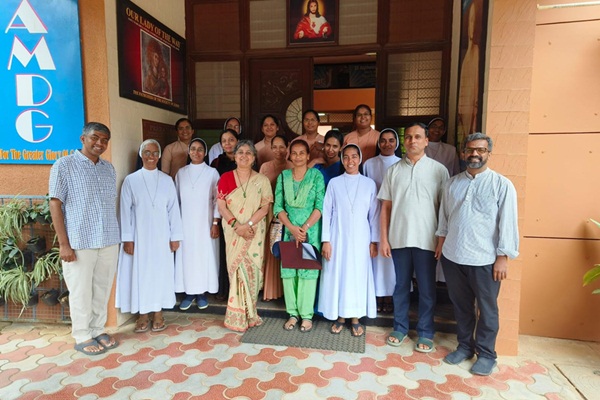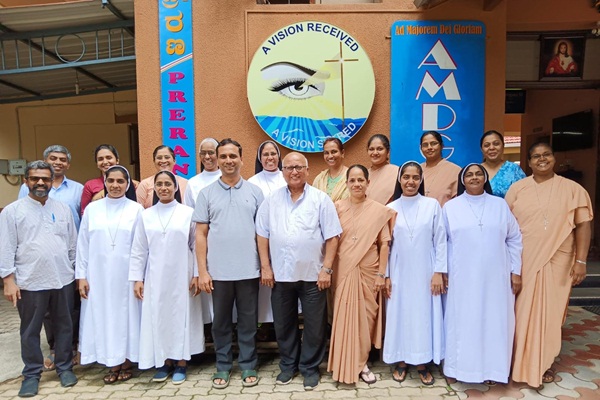
Leadership for educators on 7th July to 12th July 2023
Religious Leadership – Teachers & Educators (Batch I ) was held for 6 days from July 07 to July 12,
2023 at Prerana, Mount St Joseph’s, Bannerghatta Road, Bangalore. The objective of the training
held for leadership for educators was to develop and enhance the leadership skills of teachers and
other educational professionals.
The training was based on the premise that teacher leadership is a key factor in improving student
learning And achievement, fostering professional development and satisfaction among teachers,
creating a positive culture and climate in schools, influencing policies and practices and promoting
innovation and transformation in education systems. The program was conducted for six days. The
sessions covered various topics and activities related to teacher leadership, such as definition,
importance, characteristics, competencies, models, frameworks, opportunities, challenges,
strategies, best practices, outcomes, and impact. The sessions were designed to be interactive,
participatory, reflective and experiential. The participants were encouraged to share their
experiences, insights, opinions, and questions with each other and the facilitators. The participants
also received feedback and support from the facilitators and their peers throughout the sessions.
The training was conducted by a team of experienced and qualified facilitators who had expertise in
education and leadership. The facilitators used various method and materials to deliver the sessions,
such as presentations, discussions, case studies, role plays, simulations etc. The facilitators also
provided the participants with additional resources and references for further learning.
The first session was “A Teachers in the 21 st century” that was facilitated by Ms Gowri Mirlay. She
stressed on how teachers need to be able to inspire, motivate and guide their students, colleagues
and communities to achieve their goals and fulfil their potential. She also observed that a teacher
should not only have a vision and a strategy but also be a role model, a mentor, a collaborator and a
lifelong learner. She also talked about information literacy, communication skills, collaboration skills, critical thinking skills, creativity skills and self-directed learning skills.
The second session of the day was on “National Educational Policy” that was conducted by Fr Rohan
D’Almeida SJ. HE gave many information about the policy that was very informative.
One of the other session was on “Integral Pedagogical Paradigm” that was facilitated by Dr Vincent.
He stressed on the fact that an educator should adopt pedagogical paradigms that are learner-
centered, experiential, reflective, action-oriented and evaluative. One such paradigm is the Integral
Pedagogical Paradigm, which is derived from the Spiritual Exercises of St. Ignatius of Loyola, the
founder of Jesuits. The IPP aims to foster holistic learning that integrates cognitive, affective,
spiritual and social dimensions. The IPP also emphasizes the importance of cura personalis in
teaching and learning.
He suggested that educators need to design learning experiences that address all four dimensions of
learning in an integrated and coherent way, i.e., educators need to
* Assess the developmental levels and needs of their students in each dimension.
* Provide appropriate content and methods that match the students levels and needs in each
dimension.
* Facilitate the student’s growth and transformation in each dimension.
* Evaluate the students outcomes and impacts in each dimension.
He also stressed that by applying IPP, educators can foster integral learning that is not only
informative, but also transformative, empowering and responsible.
The third day started with sessions on “Pillars of Education”, “Multiple Intelligence” and “Learning
Styles” by the Provincial Rev Fr Dion Vaz SJ.
Fr Dion Vaz educated the participants on the four pillars of education that is learning to know,
learning to do, learning to live together and learning to be. He said that these four pillars of
education are interrelated and complementary and also that they aim to foster holistic human
development that is not only informative but also transformative.
He also educated us on Multiple Intelligence that challenges the traditional view of intelligence. He
also spoke about eight different types of intelligence that reflect different ways of processing
information and solving problems. He also stressed on the fact that education should not be based
on a single measure of intelligence or a standardized curriculum but rather on a diversified
approach that caters to the individual needs and interests of learners.
He also mentioned about the different learning styles: Visual, Auditory, Reading/writing, Kinesthetic.
It was also said that the idea behind learning styles is that one can optimize one’s learning outcomes
and performance. By knowing the learning styles of others, one can enhance one’s teaching and
communication strategies
The fourth day of sessions started with “The Natural Learning Systems”, “Instructional Leadership”
and “Work Ethics” by Fr Norbert SJ. He said that Instructional leaders aim to improve student
learning outcomes by providing support, guidance and feedback to teachers, as well as aligning the
school’s vision, goals and resources with the best practices of teaching and learning.
He also stressed that work ethic is an attitude of determination and dedication toward one’s job.
People who possess a strong work ethic place a high value on their professional success and
demonstrate moral principles that make them outstanding employees in any position.
He also gave a session on “Transformational School Leader” and “ Educating Students for Social
Responsibility” on the fifth day of the training. He said that transformational teacher is one who
creates experiences in their classrooms that engage students in active learning, critical thinking,
problem-solving and reflection. They also help students develop skills and attitudes that enable
them to become lifelong learners and agents of change in their communities.
He also explained how educating students for social responsibility is a process that aims to develop
students awareness, knowledge and skills to act ethically, respectfully and responsibly toward
themselves and others. Educating students for social responsibility helps them to understand the
complex issues that affect their local and global communities and to take action and address them.
Educating students for social responsibility also prepares them to live as active citizens in a diverse,
democratic and interdependent world.
The last day of the session was on “Programmes of animation for students”, “Mentoring classroom
observation” and “Avoiding Hassles”. It was said that mentoring, classroom observation, avoiding
hassles etc are all important aspects of effective and inclusive education. They can help teachers
improve their skills, enhance their students learning outcomes and foster a positive and respectful
classroom culture.
This training program has helped me a lot. It has increased my knowledge and understanding of
successful leadership. It has empowered me to equip me with leadership skills to lead and support
other teachers. To empower team teachers to share what works. I hope to improve my leadership
quality of learning and teaching and to focus on effective and reflective leadership practice.

